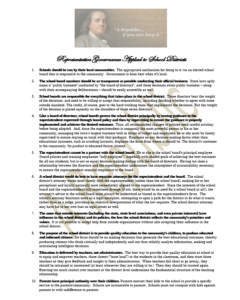Representative School Governance
Principles Which Apply to School Governance
We are in the process of developing a list of governance principles, and we want to hear from you:
What do you believe is important for guidance? 
What else should be included?
What should be edited?
What should be deleted?
Representative Governance Applied to School Districts
-
Schools should be run by their local communities. The appropriate mechanism for doing so is via an elected school board that is responsive to the community. Government is done best when it’s local.
-
The school board members should be as transparent as possible conducting their official business. State laws aptly name it "public business” conducted by “the board of directors”, and those decisions about public business – along with their accompanying deliberations – should be easily accessible as well.
-
School boards are responsible for everything that takes place in the school district. Those directors bear the weight of the decisions, and need to be willing to accept that responsibility, including deciding whether to agree with some outside mandate. The credit, of course, goes to the hard-working team that implements the decisions. But the weight of the decision is placed squarely on the shoulders of those seven directors.
-
Like a board of directors, school boards govern the school district principally by issuing guidance to the superintendent expressed through board policy and then by supervising to ensure the guidance is properly implemented and achieves the desired outcomes. Thus, all recommended changes to policies need careful scrutiny before being adopted. And, since the superintendent is commonly the most powerful person in his or her community, managing the town's largest business both in terms of budget and employees, he or she must be closely supervised to ensure staying on track with that guidance. Emphasis on any decision-making factor other than educational outcomes, such as avoiding lawsuits, displaces the focus from where it should be. The district’s customer is the community. Its product is educated future citizens.
-
The superintendent cannot be a partner with the school board. He or she is the school board’s principal employee (board policies and training emphasize “only employee”), hopefully with shared goals of achieving the best outcomes for all our students, but is not on equal decision-making footing with the board of directors. Having too close a relationship between the directors and the superintendent undermines the atmosphere of accountability necessary to ensure the superintendent remains responsive to the board.
-
A school district would do best to have separate attorneys for the superintendent and the board. The school district’s attorney works most closely with the superintendent (rather than the school board), making his or her perceptions and loyalty naturally most immediately aligned to the superintendent. Since the interests of the school board and the superintendent will sometimes diverge (if not, there would be no need for a school board at all!), the attorney’s advice to the school board must always be understood as biased in the superintendent’s favor. The school’s attorney functions more as a legal snowplow, attempting to open a path for the district to do what it wants, rather than as a judge, providing an objective interpretation of what the law requires. The school district attorney may have his or her own bias on legal issues as well.
-
The more that outside interests (including the state, state-level associations, and even private interests) have influence in the school district and its policies, the less the school district reflects the community’s priorities and values. It is not possible to accept help from outside organizations without also accepting their influence in the school district.
-
The purpose of the school district is to provide quality education to the community’s children, to produce educated and informed citizens. Its focus should be on making decisions that generate the best educational outcomes, thereby producing citizens who think critically and independently and can thus reliably analyze information, making and articulating intelligent decisions.
-
Education is delivered by teachers, not administrators. The best way to provide that quality education at school is to equip and empower teachers, those closest (“most local”) to the students in the classroom, and then trust those teachers as they give feedback and insight to their administrators. When teachers fall short or go astray, they should be retrained or reoriented (at least whenever they are willing to be.) Then they should be trusted again. Exerting too much control over teachers at the district level undermines the fundamental structure of the teaching relationship.
-
Parents have principal authority over their children. Parents entrust their kids to the school to provide a specific service to the parents/community. Schools are accountable to parents. Schools must not conspire with kids against parents or with indifference to parents.

